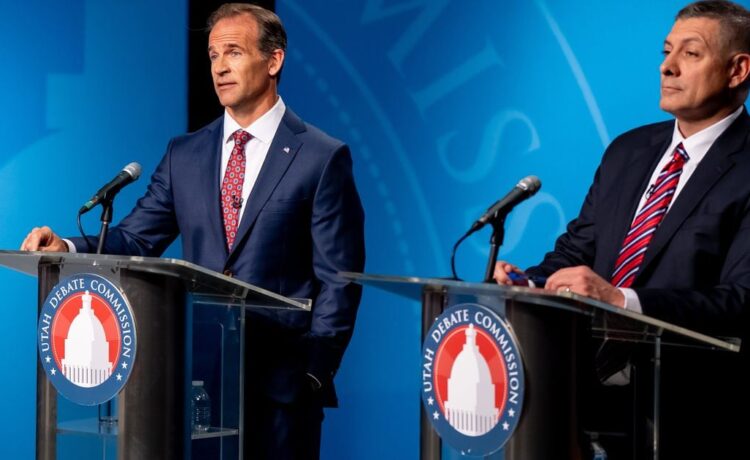Republicans Case Lawrence and Stewart Peay, two of five candidates in Utah’s 3rd Congressional District, primary missed the deadline to file required financial disclosures.
(Spenser Heaps | Pool) Case Lawrence and Stewart Peay, candidates in the Republican primary for Utah’s 3rd Congressional District, take part in a televised debate at the Eccles Broadcast Center in Salt Lake City on Wednesday, June 12, 2024.
Last week, the quintet of Republicans in the primary election for Utah’s 3rd Congressional District seat said members of Congress should be required to disclose the names of any companies in which they hold an investment. But two of the candidates have not yet filed a required Financial Disclosure Report with the U.S. House of Representatives.
Federal law requires every congressional candidate to publicly disclose their assets, income and liabilities at least 30 days before the primary election. Utah State Auditor John Dougall, State Sen. Mike Kennedy and Roosevelt Mayor JR Bird all met the deadline for filing.
“It should be the least we can do as congresspeople is require transparency about finances, both our own investments, our own stock trading, but also those who contribute and donate to our campaigns,” entrepreneur Case Lawrence declared during the debate. “That’s a small sacrifice to pay in order to encourage and further enhance people’s trust in Congress, which is at an all-time low.”
According to the most recent Federal Election Commission disclosures, Lawrence has mostly self-funded his campaign, loaning the effort $2.5 million.
Despite the commitment to transparency, Lawrence has not filed his disclosure report or asked for an extension. Lawrence’s campaign did not respond to questions from The Salt Lake Tribune.
Attorney Stewart Peay also failed to file his disclosure report. In a text message to The Tribune, Peay called it an oversight that he would correct immediately. Peay did file a financial disclosure for his 2017 congressional campaign, where he was eliminated from the race at the GOP nominating convention.
Members of Congress and certain staffers are also required to disclose their personal finances. The penalty for violators is minimal: a $200 fine.
On his disclosure, Bird listed ownership of two office buildings worth between $1 million and $5 million. Last year, the rental income from those properties was between $50,000 and $100,000. Paragon Oilfield Products, the company he owns, earned more than $2 million last year and paid him a salary of $93,000. Bird also listed ownership of one bank account worth between $1 million and $5 million. He did not disclose any investments.
Kennedy’s filing shows he earned a $90,000 salary from his medical practice, which he values between $100,000 and $1 million. He also lists several investment accounts worth up to $1.3 million.
The maximum value of Dougall’s investment and retirement accounts is around $4 million, from which he earned approximately $3,500 in dividends and interest last year. His only other income was from Eyering Systems, a California-based engineering consulting firm of which he’s a co-owner.

















